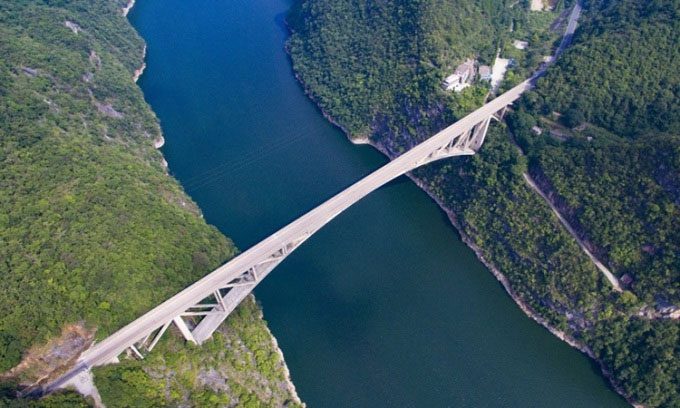Chinese Engineers Develop Advanced Techniques for Building Bridges in Challenging Mountainous Regions.

Bridge over the Jiangjie River in Guizhou Province. (Photo: CFP).
A total of 81 individuals and 50 teams were honored at the National Engineering Awards for their outstanding contributions in the construction technology field in Beijing on January 19, according to CGTN. One of the award-winning teams consists of engineers from Guizhou Province in southwestern China. They developed 7 modern techniques and constructed 12 world-class bridges despite challenging geographical conditions, fragile ecological environments, and various other obstacles.
On January 11, the main arch of the Wumengshan Bridge on the Nayu – Qinglong expressway was completed. This marked the first time that full precast lifting technology was used in mountainous regions worldwide. Zhang Shenglin, a member of the award-winning engineering team, stated that in the deep gorges of the mountain range, they constructed tunnels at both ends of the bridge. “Typically, we would need to use a large bridge-building machine for construction. Instead, we applied a lifting system to install all components, which increased our efficiency,” Zhang said.
According to Han Hongju, the team leader, when they were constructing the Beipanjiang Bridge on the Guanhun expressway, there was no road leading to the proposed construction site. All materials had to be transported by manpower or horseback. The distance from their base to the bridge site was over 10 kilometers, taking approximately 4 hours to travel.
A suspension bridge crossing the major gorge above the Hua River in Guizhou Province is set to become the highest bridge in the world upon its completion in early 2025. At a height of 625 meters from the bridge deck to the water surface, the Hua River gorge bridge will span a total length of 2,980 meters, with a main span of 1,420 meters. The main structure of the bridge is expected to be completed in 2024. Once operational, the bridge will reduce travel time through the gorge from 70 minutes to just one minute, promoting tourism and modernizing rural areas in the region.
Another bridge spanning the Jiangjie River, also in Guizhou, constructed by the award-winning research team, not only facilitates local transportation but also provides numerous economic and ecological benefits. Mu Jinwei, a member of the team, stated that the materials used for construction were all recycled earth and waste stone from roadbed construction. With breakthroughs in machine-mixed sand concrete technology, the amount of material used for bridge construction exceeded 100 million cubic meters, saving over $3.19 billion in costs and reducing carbon emissions by more than 3.3 million tons, according to Mu.


















































